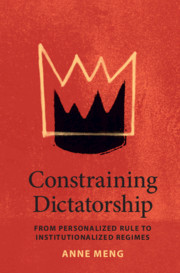Crossref Citations
This Book has been
cited by the following publications. This list is generated based on data provided by Crossref.
Jiang, Junyan
Xi, Tianyang
and
Xie, Haojun
2020.
In the Shadows of Great Men: Leadership Turnovers and Power Dynamics in Autocracies.
SSRN Electronic Journal,
Chen, Ling
and
Zhang, Hao
2021.
Strategic Authoritarianism: The Political Cycles and Selectivity of China's Tax‐Break Policy.
American Journal of Political Science,
Vol. 65,
Issue. 4,
p.
845.
Reuter, Ora John
2021.
Why Do Ruling Parties Extend Authoritarian Rule? Examining the Role of Elite Institutions and Mass Organization.
SSRN Electronic Journal ,
Meng, Anne
2021.
Winning the Game of Thrones: Leadership Succession in Modern Autocracies.
Journal of Conflict Resolution,
Vol. 65,
Issue. 5,
p.
950.
Gochberg, William
and
Menaldo, Victor A.
2021.
Political Economy and the Three Sources of Rents.
SSRN Electronic Journal ,
ARRIOLA, LEONARDO R.
DEVARO, JED
and
MENG, ANNE
2021.
Democratic Subversion: Elite Cooptation and Opposition Fragmentation.
American Political Science Review,
Vol. 115,
Issue. 4,
p.
1358.
Opalo, Ken Ochieng’
and
Smith, Lahra
2021.
Ideology and succession politics in Ethiopia: autocratic leadership turnover and political instability.
Democratization,
Vol. 28,
Issue. 8,
p.
1463.
Kim, Nam Kyu
and
Sudduth, Jun Koga
2021.
Political Institutions and Coups in Dictatorships.
Comparative Political Studies,
Vol. 54,
Issue. 9,
p.
1597.
Cope, Kevin L.
and
Crabtree, Charles
2021.
Migrant-Family Separation and the Diverging Normative Force of International Law and Constitutional Law.
SSRN Electronic Journal,
Baturo, Alexander
2022.
When incumbents do not run: presidential succession and democratization.
Democratization,
Vol. 29,
Issue. 1,
p.
74.
Heyl, Charlotte
and
Llanos, Mariana
2022.
Contested, violated but persistent: presidential term limits in Latin America and sub-saharan Africa.
Democratization,
Vol. 29,
Issue. 1,
p.
1.
Harkness, Kristen A.
2022.
The Ethnic Stacking in Africa Dataset: When leaders use ascriptive identity to build military loyalty.
Conflict Management and Peace Science,
Vol. 39,
Issue. 5,
p.
609.
Hunt, Eileen M.
2022.
The Past, Present, and Future States of Political Theory.
Society,
Vol. 59,
Issue. 2,
p.
119.
Frantz, Erica
Kendall-Taylor, Andrea
Li, Jia
and
Wright, Joseph
2022.
Personalist ruling parties in democracies.
Democratization,
Vol. 29,
Issue. 5,
p.
918.
Liu, Amy H.
2022.
Pronoun Usage as a Measure of Power Personalization: A General Theory with Evidence from the Chinese-Speaking World.
British Journal of Political Science,
Vol. 52,
Issue. 3,
p.
1258.
Gerzso, Thalia
and
van de Walle, Nicolas
2022.
The Politics of Legislative Expansion in Africa.
Comparative Political Studies,
Vol. 55,
Issue. 14,
p.
2315.
Paine, Jack
2022.
Strategic Power Sharing: Commitment, Capability, and Authoritarian Survival.
The Journal of Politics,
Vol. 84,
Issue. 2,
p.
1226.
Hartmann, Christof
2022.
Authoritarian origins of term limit trajectories in Africa.
Democratization,
Vol. 29,
Issue. 1,
p.
57.
Kravtsov, Vlad
2022.
Autocracy and Health Governance in Russia.
p.
189.
Kroeger, Alex
and
Kang, Alice J.
2022.
The Appointment of Women to Authoritarian Cabinets in Africa.
Government and Opposition,
p.
1.





